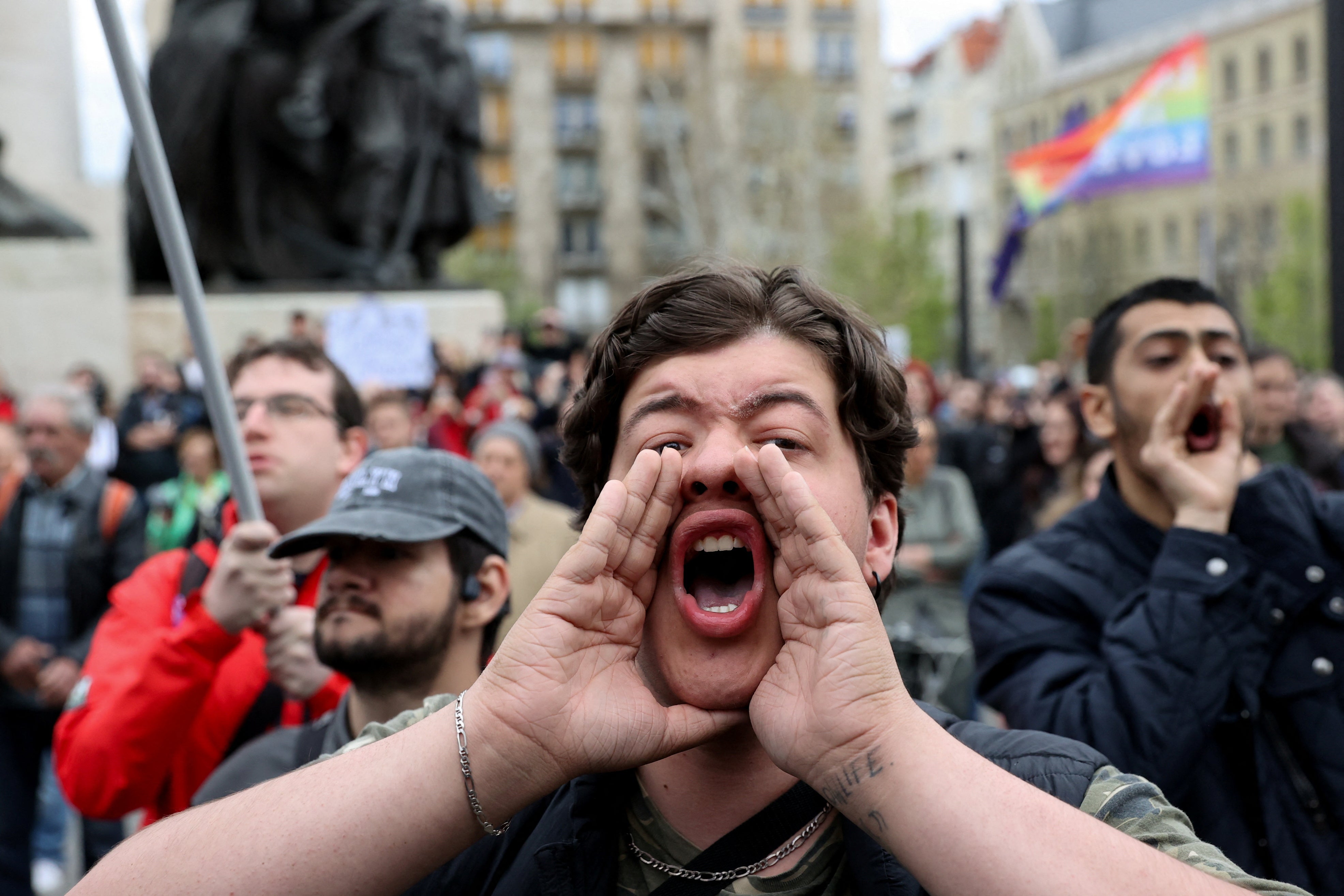Hungary has passed a constitutional amendment allowing authorities to ban LGBT+ public events such as Pride marches – a move seen as another step toward authoritarianism by the country’s populist government.
Opposition politicians and other protesters attempted to blockade entrances to parliament ahead of the vote on Monday. Inside, air horns were used in an attempt to disrupt the vote.
The amendment codifies a law fast-tracked through parliament in March that bans public events held by LGBT+ communities, including the popular Pride event in Budapest that draws thousands annually. It declares that children’s rights to moral and spiritual development supersede any other right, including that to peacefully assemble.
Nationalist prime minister Viktor Orban, in power since 2010, faces elections in 2026 with the economy struggling and a new opposition party posing the strongest challenge yet to his rule. The constitutional amendments are part of Mr Orban’s political campaign to boost his core voter base and also lure votes from the far right, some analysts said.

Mr Orban has pledged to crack down on foreign funding of independent media and non-governmental organisations in Hungary while scaling up his political campaign against the LGBT+ communities.
That law also allows authorities to use facial recognition tools to identify people who attend prohibited events – such as Budapest Pride – and can come with fines of up to 200,000 Hungarian forints (£450).
David Bedo, a legislator with the opposition Momentum Movement party who participated in the attempted blockade, said before the vote that Mr Orban and Fidesz have for the past 15 years “been dismantling democracy and the rule of law, and in the past two or three months, we see that this process has been sped up”.
He said that as elections approach next year and Mr Orban’s party lags in the polls behind a popular new challenger from the opposition, “they will do everything in their power to stay in power”.

Hungary’s government has campaigned against LGBT+ communities in recent years and argues its “child protection” policies, which forbid the availability to minors of any material that mentions homosexuality, are needed to protect children from what it calls “woke ideology” and “gender madness”.
“This whole endeavor which we see launched by the government, it has nothing to do with children’s rights,” said Daniel Dobrentey, a lawyer with the Hungarian Civil Liberties Union, calling it “pure propaganda”.
The new amendment also states that the constitution recognizes two sexes, male and female, an expansion of an earlier amendment that prohibits same-sex adoption by stating that a mother is a woman and a father is a man.
The declaration provides a constitutional basis for denying the gender identities of transgender people, as well as ignoring the existence of intersex individuals who are born with sexual characteristics that do not align with binary conceptions of male and female.

In a statement on Monday, a government spokesperson said the change is “not an attack on individual self-expression, but a clarification that legal norms are based on biological reality”.
Mr Dobrentey said it was “a clear message” for transgender people and “purely and strictly about humiliating people and excluding them, not just from the national community, but even from the community of human beings”.
The amendment is the 15th to Hungary’s constitution since Mr Orban’s party unilaterally authored and approved it in 2011.
Adam Remport, a lawyer with the HCLU, said that while Hungary has used facial recognition tools since 2015 to assist police in criminal investigations and finding missing persons, the recent law banning Pride allows the technology to be used in a much broader and problematic manner. That includes monitoring and deterring political protests.

“One of the most fundamental problems is its invasiveness, just the sheer scale of the intrusion that happens when you apply mass surveillance to a crowd,” Remport said.
“More salient in this case is the effect on the freedom of assembly, specifically the chilling effect that arises when people are scared to go out and show their political or ideological beliefs for fear of being persecuted,” he added.
The amendment passed Monday also allows for Hungarians who hold dual citizenship in a non-European economic area country to have their citizenship suspended for up to 10 years if they are deemed to pose a threat to public order, public security or national security.
Hungary has taken steps in recent months to protect its national sovereignty from what it claims are foreign efforts to influence its politics or even topple Mr Orban’s government.
Reuters and Associated Press contributed to this report



